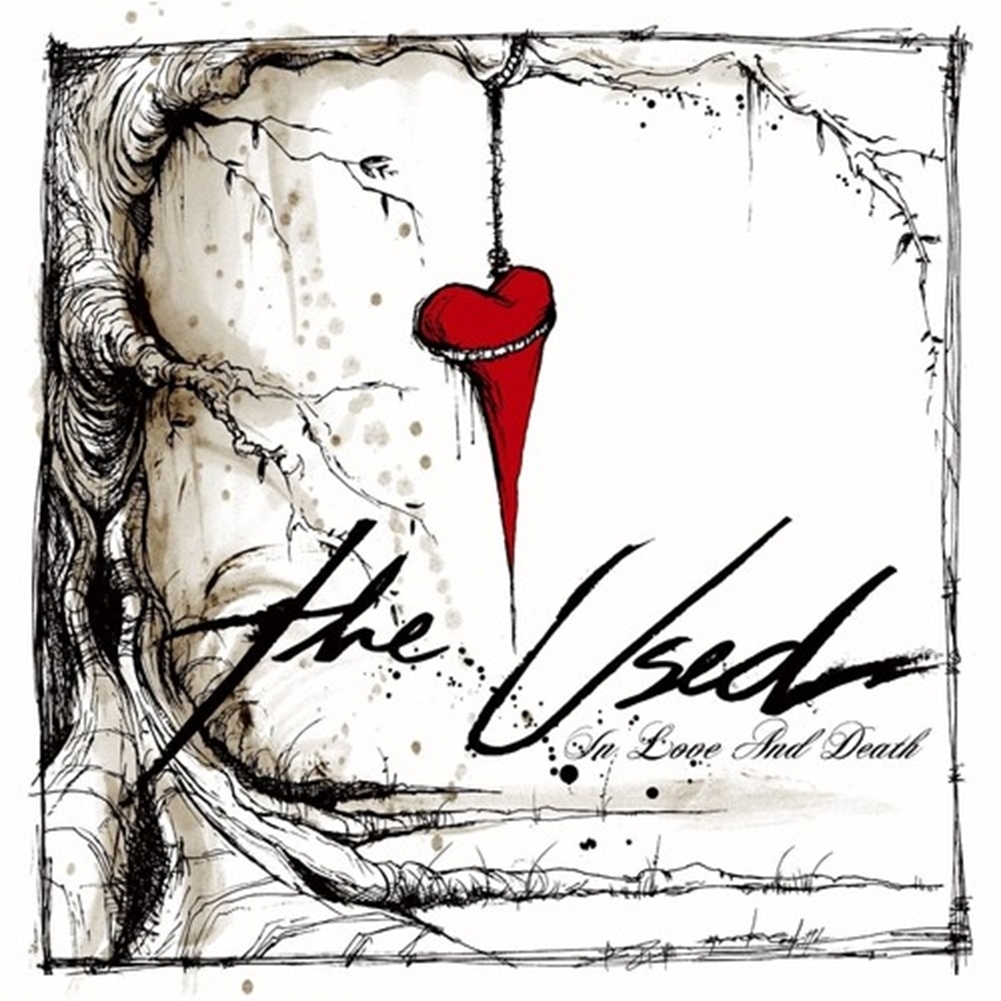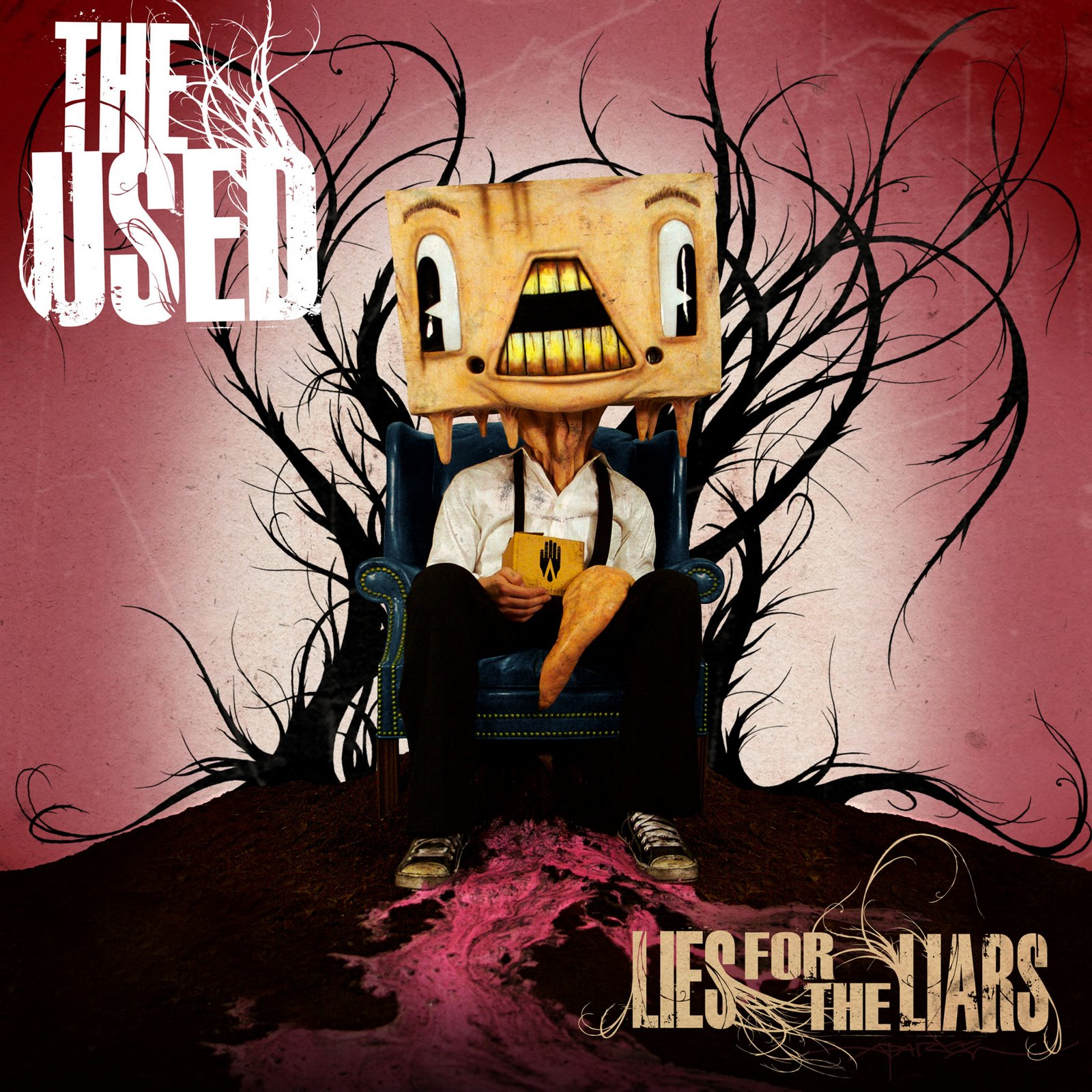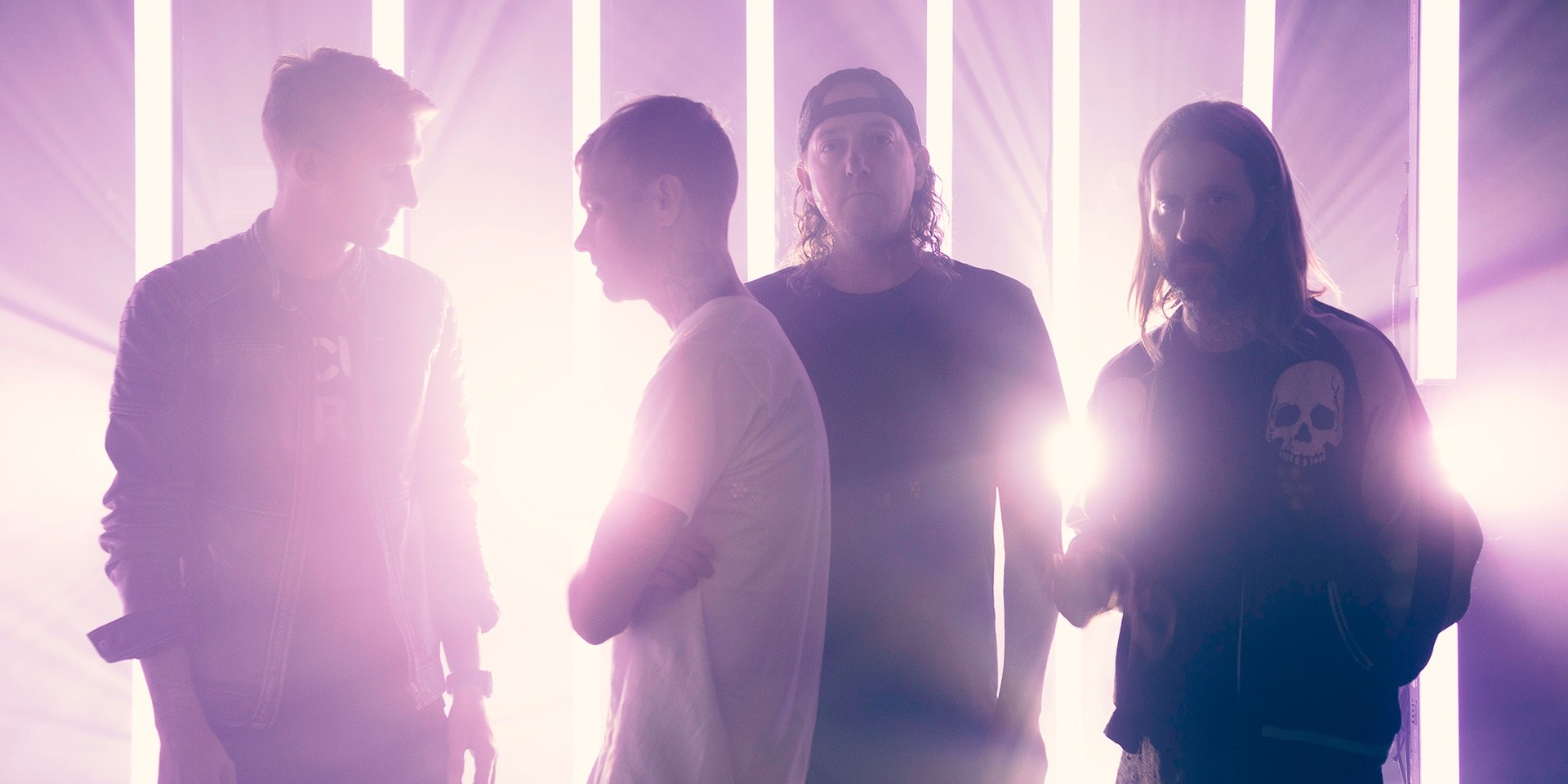The Used may have spent their 2016 performing their first two albums to sell-out crowds across the US — to the delight of adoring fans, many of whom are now working adults — but 2017 was a chance at a rebirth of sorts for the four-piece.
While the band, led by vocalist Bert McCracken, have spared no expanse to shift the band's stylistic trajectory throughout their career — from the band's vengeful and anthemic In Love And Death to their colourful electronica explorations on Vulnerable — their latest effort The Canyon shakes off all expectations that the band have accumulated over the past decade.
Clocking in at a monolithic 78 minutes — an anomaly for modern alternative rock — The Canyon is wholly immersive and freewheeling, strung together by an expansive pop sensibility and air-tight, analogue production by Ross Robinson.
We speak to McCracken as he helps outline the band's discography and paints us a picture of a band who struck big, fell apart and began the process to rebuild and restore.

The Used (2002)
This was the band’s debut and you were all really young at that time. How was the general sentiment amongst everyone in the band?
I think with youth comes fearlessness, so we were definitely more anxious and excited."
What do you remember from recording the album?
I remember Venice Beach and a Charlie Roger motel and being surprised by what I thought was the punk rock world with John Feldmann. It was a lot more Hollywood that I thought it would be.
The recording process with a producer was a brand new thing for us — having someone else come in and change parts of your song was a striking thing for us."
You guys were also on the Warped Tour early in your career. What do you remember from that tour?
We started on a very small stage. Very quickly, we were growing in popularity and the crowd sizes began overwhelming the capacity of the small stage. By the end of our first Warped Tour, they had to move us to the main stage.
That was an indication of what success looked like to me at the time: playing the main stage to a sea of people. I thought that was what success was and that was as far as I needed to go."
NME has ranked the album as one of "20 emo albums that have resolutely stood the test of time". Do you agree with that?
I think the genre, the name "emo", is kind of a strange thing because all genres evoke some kind of emotion. This record touches a certain kind of honesty that maybe wasn’t really translating through enough in pop-punk, or what was becoming post-punk at the time. Yeah, I’m really proud of the first record."
The Used struck big when they signed to major label Reprise Records, releasing their self-titled debut album a year after issuing their demo CD, Demos From The Basement. A year later, they embarked upon ambitious headlining tours, with support from Taking Back Sunday and My Chemical Romance.

In Love And Death (2004)
This record was borne out of tragedy for you and the rest of the band. How did you cope and learn to channel what you felt into your music?
I don’t think I had to learn to channel it into the music, it just kind of happened. [McCracken's ex-girlfriend] Kate passed at the very end of the recording process so the majority of the songs already written I think.
I learnt pretty early on that music has potential for catharsis but I was years away from learning about the healing process, and I think we touched on some pretty important emotional and psychological truths. We asked a lot of bigger questions in this record than the first."
The recording process itself was also plagued with difficulties. Do you think the tension from the making of the record actually added to the urgency of the songs?
Of course. Everything that happens during the recording process plays a part in how the record turns out. It’s sort of like a snapshot of how the artist is at that moment and that’s how we were feeling at that point."
You guys have played this album and the self-titled live in recent years. Revisiting those albums after so long, what do you take away from them now?
It’s strange how songs can transcend time — how these songs can mean so much more to a complete stranger from a different part of the world and how they can relate to something I wrote so many years ago.
The songs now mean something different to me from when we wrote them like 13 to 15 years ago. The fans who have been with us since our earliest releases may have a different view about the record and it’s insane how it can mean so many different things to so many different people."
Out of all the songs on the record, which is the one you feel proudest of?
I guess 'Hard To Say' because it was the most honest I had ever been in my writing up to that point."
The band quickly followed up their highly-successful debut album with In Love And Death, arguably their most iconic album to date. Selling over 500,000 copies in the US alone, the album made the band a minor mainstream success.

Lies For The Liars (2007)
At this point in your career, the mainstream interest in the pop-punk/emo genre was beginning to wind down and you guys were on a major label as well. Was there any pressure to deliver a hit album?
I’ve never really felt any pressure from the label side of things to be honest. I think whatever inspired us and whatever we felt at that moment always dictated where the songs came from and that led to how the album was going to sound like."
What do you like the most from this album?
I think 'The Ripper'’s pretty great. I think it’s a lot more of a philosophically and logically heavier song than everyone made it out to be. It’s really deep."
Lies For The Liars continued the band's chart success, peaking at number 5 on the US Billboard Charts. The album was the start of a sea change for the band, replacing founding drummer Branden Steineckert with the talents of Good Charlotte's Dean Butterworth for the album's recording process.

Artwork (2009)
The band almost entered the studio to record Artwork with Weezer’s Rivers Cuomo. Is that true?
There were some talks about it, yeah. At that point in my career, I was the most severely intoxicated and alcoholism. During the talks, I probably wasn't very aware."
Do you think that hindered the recording process?
I think it goes back to that vision of what mood you’re in when you’re making the record. It’s a reflection of the person I was at that point.
It's a very emotionally brutal, sad and lonely record and that’s what I was during those months of recording and writing. I don’t know if it hindered or made the album better but it made the album how it was meant to be at the time."
During interviews leading up to the album’s release, you described the album as gross-pop. Is that a genre tag that the band still likes to use right now?
Pop music, I think, has a few specific conversations. I think pop songs follow a Beatles song structure, where it's "A, B, A, B, C" then back to the chorus and so on. I think pop music also involves a really catchy melody and for our songs, sometimes, the content can be more graphic than what’s out there on the more popular genres.
We’ve always been interested in writing a really catchy chorus. I come from a pop world. Growing up, I was first exposed to ‘80s pop music and then from there it went into rock. So for us, it kind of made sense to really add in that element into our music."
Despite rumours of Cuomo's involvement with the band for Artwork, production duties were handed to Matt Squire (Panic! At The Disco/Boys Like Girls) after deciding not to work with their long-time collaborator John Feldmann. Artwork marks the last album The Used would release on a major label.

Vulnerable (2012)
What do you think about this album now?
I think when you’re in a band, sometimes relationships are constantly evolving and the way you’re working becomes habitual and convenient sometimes. We’ve been doing all our albums with John Feldmann a lot and it seemed like the easy route. His approach to music at this point in time was very digital and very fixed.
Producing in his mind meant making the track perfect. I was entering sobriety and I had dialed back the drinking so there were a lot of ups and downs and because of that, there was a lot of honesty and positivity that was captured in a lot of the songs."
You brought back John Feldmann to produce the record after not working with him on Artwork. What made you want to go back to him?
I think it was a matter of convenience. The way the band was at the time, everyone just stayed in their lanes and worked on the songs we had written.
The songs we had written seemed easier to write around a computer — like, we used a computer a little bit more than we had on Artwork."
How did fans react to the songs when they heard them live for the first time during the tour for this album?
Objectively, it would be impossible for me to answer that question but I think they reacted great. I think, at the time, it was a newly-released record and the fans were very loyal.
There are a lot of catchy songs on the record, 'I Come Alive' is a really fun track live, it’s really popular.
Joining independent label Hopeless Records allowed the band to experiment with their sound, infusing hip-hop and electronica into their patented emo-influenced pop rock sound.

Imaginary Enemy (2014)
With Imaginary Enemy, I read that the vocals were recorded first. Is that correct?
On a lot of the songs, yes. There were a lot of problems getting musicians into the studio. I had these ideas and it was damn near impossible for me to not write about what I saw going on and how the world is just in this downward spiral.
For a lot of the songs, we took a couple of political statements and turned them into songs."
This was the band’s first record to be released on your own label. At this point in your career, did you feel the need to own the music that you make?
Owning the music is just like trying to fight capitalism: it’s a huge monster to go up against. We’re just constantly trying to think of new ways to get more one-on-one contact with our fans, without having to funnel money through big, faceless entities who just suck up all the dollar bills."
Do you think in a sense that creating the label was a response to the lyrical themes of the album?
Of course, yeah. It’s ideal, like I said, we have the power to change things. I don’t think a lot of fans understand that when you buy music from distributors like iTunes, they take almost half of the money.
Spotify counts one full record as 1500 plays and it’s like 0.008 cents per play. It’s in the world of music that everything gets stolen from the musician. I feel like it’s my duty to inform the fans. The information is slowly becoming available so, in the meantime, I’ll educate them instead."
Is that one of the reasons why you decided to work with Hopeless Records, an indie label?
Yeah. They do a lot of work for charity and they’re very transparent about their passions and they’re really trustworthy people.
We try to keep making music and releasing it on there because a record like The Canyon — which really focuses on emotions and feelings, and just showing people they’re not alone in whatever shitty issue they’re facing right now — there’s no better people to work with on that than the guys at Hopeless Records."
While remaining on Hopeless, The Used formed their own imprint, GAS Union, for the release of Imaginary Enemy, which sees the band exploring, for the first time, heavy political themes.

The Canyon (2017)
For this record, you worked with Ross Robinson, and he's worked with a multitude of alternative rock, emo, post-hardcore and nu metal bands. Why him?
When we did Live & Acoustic At The Palace, we had this epiphany of a few moments where we understood the power of music and the mistakes we make. Trying to make everything perfect was maybe doing the band injustice because we’re such a great live band, and that’s when we’re at our best, when we’re messing up and having fun and laughing about it.
We were so confident about our live abilities that we wanted to make a record that would sound and feel like it was ripped out of one of our live shows, the raw energy.
During our first meeting with Ross, he was talking about recording on tape and not using a computer at all. He didn't fix anything, there was no auto-tune on the vocals, leaving the mistakes in, doing minimal takes on tracks, recording the drums live and we just fell in love — that was all we needed to hear.
It’s something a lot of bands don’t have the guts to do because you really have to kind of prove yourself in the studio. It’ll work out great, or you’ll fall flat on your face."
Touching back on your point about pop songs, the songs on this record breathe pop euphoria, but they’re also vastly different from anything else you’ve put out before.
Going into the studio, did you fear that the fans would not be able to connect to the new songs in ways that the older records could?
We’re at a place in our careers where we’re confident in our expression of art. What we get to create is so exciting. Music is so subjective.
We’re just excited that we’re able to make the music that we want to make, the music that we love. It’s not for everyone and we’re fine with that. During the creative process, I got way too deep to care what anyone else would think."
As for the length of the record, do you think it was essential to keep it at its current length?
I’m inspired by art and it’s an evolved inspiration from what it was ten years ago. The things that inspire me the most are the things and situations that make me work to kind of get through it.
I think the human race just naturally deserve a challenge. Peace and fulfillment come afterwards, once the challenge has been completed. Art bridges the gaps between us and the bigger questions in the universe. I wanted to give people a challenge. That’s what I expect out of great art.
I can’t look at a painting that someone worked on for four months and decide in 30 seconds if I like it or not. Right now, we’re looking at art in a different way and we wanted this to be a gift to our 12-year-old selves — who would be so content with just listening to a record, getting out the lyric booklet and trying to decipher what everything means — from the very beginning to the complete end, without skipping any songs because it’s supposed to be a complete story.
In my opinion, the record doesn't really work unless you hear it in its entirety."
The Canyon is a sprawling effort by The Used, earning their highest score on Metacritic at 75, and a continuation of their relationship with Hopeless Records.
Looking back at all the records you’ve released, could you rank the records in your opinion?
The Canyon is, by far, the best record we’ve done. It’s the most honest, the most open and sincere, the deepest. It takes the number one spot by miles. I think the second spot would be a tie between our first two records, I think the urgency is the most prevalent then, it’s youthful.
I would put Imaginary Enemy at number three because there are a lot of important political messages that I think we could learn a lot from, now more than ever. Artwork gets the fourth spot for its brutality and dark honesty. I think Lies For The Liars and Vulnerable would be tied.
Are there any upcoming plans to tour Asia and Singapore?
Definitely, we’re trying to working something out so hopefully we can get it all sorted and announce something soon!
The Canyon is now available on all digital platforms, CD and vinyl.
Like what you read? Show our writer some love!
-
